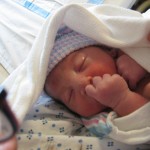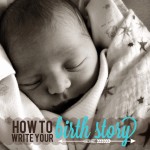 Thirteen years have passed since I gave birth to my first daughter, but reflecting on the moment when she was safely delivered from the darkness of my womb into a new world of light, I recall the mixture of emotions I felt that night.
Thirteen years have passed since I gave birth to my first daughter, but reflecting on the moment when she was safely delivered from the darkness of my womb into a new world of light, I recall the mixture of emotions I felt that night.
I was young, only 20, and despite reading a wealth of books promising to deliver me safely into the foreign territory of motherhood, I now recognize that I was ill prepared for the birth of my first child. I believed that doctors, due to their level of expertise, should bear the primary responsibility for determining the course my labor would take. I made no birth plan, and did not give much consideration as to how I would manage the pain of childbirth. I only hoped that I could breath through the contractions and have my baby without the assistance of pain medication. But now I realize that being able to have your child without these readily available, and quite attractive, medications you must physically, spiritually and mentally prepare yourself for the labor before you. As a marathon runner would never attempt to complete a 26-mile run without rigorous training, so a woman planning to birth her baby naturally must consider how she will accomplish this feat.
Today, I meet scores of women who share a similar perspective on birthing their first child. Many of them say they would like to have their baby naturally, but they aren’t necessarily aware of medical interventions that may preclude them from doing so. During my first labor, although I was progressing normally, my doctor ordered that I be given Pitocin, a hormone given to women to accelerate the process of labor. Pitocin effectively induces labor, but it also changes the nature of contractions, making them more painful. There are times when a doctor or midwife must order Pitocin for a pregnant woman. For example, if her membranes rupture, many hospitals require that she deliver her baby within twenty-four hours due to the increased risk of infection after that window has elapsed. If active labor does not begin naturally, she may need Pitocin to induce contractions. But many women do not need the assistance of Pitocin because their bodies are producing the necessary hormones to facilitate the birth of their baby. Unfortunately, some doctors or midwives put women on a timetable according to their own schedule, and the laboring woman’s wishes to birth naturally become a secondary consideration. Reflecting on my first birth experience, I wonder if I would have been able to deliver my daughter naturally if I had refused the Pitocin. But it is a question that will never be answered.
Upon arriving at the hospital, I was 6 cm dilated and 100% effaced. I remember being in pain, but it was manageable. The nurses admitted me and completed routine fetal monitoring. Afterward, I asked if I could walk around because I knew that this would catalyze labor. They responded that I could not, as they were preparing to break my water and begin Pitocin intravenously. Shortly after these procedures were completed, my pain was magnified. I quickly began to mentally panic, thinking that I would not be able to withstand the severity of the contractions. I remember telling my mother, my labor coach, that I thought the pain was going to kill me. She assured me that it would not, and did her best to comfort me, but pain was my primary focus. I was tense, and with each piercing jolt in my uterus, I doubted my ability to continue. Seeking escape, at 8 cm, I asked for the epidural. I did not realize that an epidural could slow down my labor, thereby increasing my chances of having a caesarean delivery, I only knew that it would erase the pain, and it was on this that my mind fixated.
The epidural was blessed relief from the agony, and I gave thanks that such medical advancements could offer deliverance. Thankfully, the epidural did not slow my labor. It worked as it was intended, and I experienced no complications other than my blood pressure dropping dramatically, but this did not affect the labor process. Shortly after receiving the epidural, it was time to push. Within 15 minutes and three focused efforts, my daughter Madison was born. Despite the fact that I was not able to birth her naturally as I desired, her entrance into this world was glorious. I was transfixed by the emergence of this brand new life.
 The moment a child is conceived is the instant in which that life begins, but an equally enthralling point in time is that moment when a child is born. When Madison was born and we heard her first utterance, a high-pitched cry, we rejoiced. She cried, as all healthy newborns do, as she was struck by the new complexities of her world. She once resided in darkness and now in light. She had grown accustomed to the pulsing of my heartbeat and the blood rushing through my veins, but now she was separated from these familiar sounds. But as she was placed on my chest, she quieted, once again sensing that familiar sound of her mother’s heartbeat. And as her eyes adjusted to the light, light that first blinded her, she was able to begin to learn to see. Our eyes met and we studied one another, in wonder over our discoveries. As I gazed at her, my eyes caressed every feature of her face and I remember thinking, “I am a mother.”
The moment a child is conceived is the instant in which that life begins, but an equally enthralling point in time is that moment when a child is born. When Madison was born and we heard her first utterance, a high-pitched cry, we rejoiced. She cried, as all healthy newborns do, as she was struck by the new complexities of her world. She once resided in darkness and now in light. She had grown accustomed to the pulsing of my heartbeat and the blood rushing through my veins, but now she was separated from these familiar sounds. But as she was placed on my chest, she quieted, once again sensing that familiar sound of her mother’s heartbeat. And as her eyes adjusted to the light, light that first blinded her, she was able to begin to learn to see. Our eyes met and we studied one another, in wonder over our discoveries. As I gazed at her, my eyes caressed every feature of her face and I remember thinking, “I am a mother.”
That night as I lay in the hospital bed, I silently repeated that statement, “I am a mother.” The weight of those words hit me for the first time and I was struck by the enormity of the responsibility of a mother. This child was dependent upon me. I felt inadequate for the task. I felt I was not ready and in truth, I wasn’t. But who is? In those early years, I wrestled with myself as I strove to become the type of mother I thought my daughter deserved. Slowly, I began to realize that there were a number of things I must sacrifice in order to nurture the love that had begun to bloom in my heart for my daughter. It was a struggle at times, placing the needs of my daughter before my own, but by God’s grace, I began to grow into the role of a mother. Motherhood, at first unfamiliar and scary, began to become a part of me. As the flower of unconditional love unfolded within me, I found that I was changed. Motherhood has transformed me much more than I could have anticipated in that hospital room on the night of February 3, 2000. And it continues to shape the woman I am today.
Many thanks to Sarah Rulli for sharing her story. Would you like to share your birth story? We’d love to hear it! Take a look at our “What’s Your Story?” post to find inspiration and direction.





